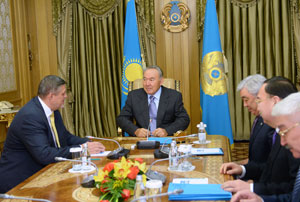 ASTANA, Dec. 1 – Kazakhstan remains willing to help Afghanistan through a variety of mechanisms, including training programmes that bring Afghan students to study in Kazakhstan, President Nursultan Nazarbayev told Special Representative of the U.N. Secretary General Jan Kubis in a meeting on Nov. 28 in Astana.
ASTANA, Dec. 1 – Kazakhstan remains willing to help Afghanistan through a variety of mechanisms, including training programmes that bring Afghan students to study in Kazakhstan, President Nursultan Nazarbayev told Special Representative of the U.N. Secretary General Jan Kubis in a meeting on Nov. 28 in Astana.
Kubis, who is head of the U.N. mission to assist Afghanistan, visited the Kazakh capital from Nov. 27-28, meeting with the President, Chairman of Kazakhstan’s Senate Kassym-Jomart Tokayev, Foreign Minister Erlan Idrissov and other officials.
In meetings with Kazakh officials, Kubis discussed Kazakhstan’s cooperation with the U.N., preparations for Afghanistan’s presidential elections next year, U.N. efforts to stabilise the country and its economy, and regional threats, including drug trafficking and terrorism. “Naturally, I was very glad to hear confirmation from the President of Kazakhstan’s readiness to continue to cooperate and help Afghanistan,” Kubis said after his meeting with Nazarbayev, also adding that they discussed ongoing preparations for the presidential election in Afghanistan next April and their implications for the situation in that country.
Regional cooperation is seen as key to stability in Afghanistan and the region as a whole after U.S. and NATO troops withdraw from the nation next year. Kubis has visited several other countries in Central Asia over the past few months, including a stop in Uzbekistan in late October, to discuss regional security and cooperation issues.
Kazakhstan has long had a key support and logistics role in operations in Afghanistan. The country’s rail and road systems are part of the Northern Distribution Network, through which a significant portion of U.S. cargo is transported to Afghanistan. Kazakhstan has provided aid to Afghanistan to support the nation’s agriculture, education, healthcare and transportation sectors, and is a backer of major transregional energy projects involving Afghanistan, including the Turkmenistan-Afghanistan-Pakistan-India (TAPI) gas pipeline and the electricity conduit between Kyrgyzstan, Tajikistan, Afghanistan and Pakistan called CASA-1000.
At the Istanbul Process Ministerial Conference in Almaty last spring, which focused on Afghanistan’s development, President Nazarbayev said, “The main element of the international assistance programmes is about the economic rehabilitation of Afghanistan. We need to speed up regional economic cooperation and integrate Afghanistan in this process.”
It is expected that about 8,000-12,000 of the roughly 50,000 U.S. troops currently in Afghanistan would stay in the country after the 2014 withdrawal. Recent tensions between the U.S. government and Afghan President Hamid Karzai over Karzai’s delay in signing an agreement about the remaining troops has led the White House to warn it would withdraw all troops if an agreement isn’t reached soon.
